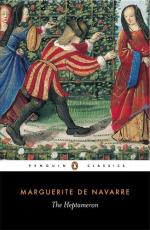“But how impudent of him,” said Oisille, “to pervert the meaning of the text to suit his fancy, thinking that he had to do with beasts like himself, and shamelessly trying to entice the poor little women so that he might teach them how to eat raw flesh at night.”
“True,” said Simontault; “but you forget that he saw before him those young tripe-sellers of Amboise in whose tub he would fain have washed his ------ shall I name it? No, but you understand me--and have treated them to a taste of it, not roasted, but stirring and frisking, so as to please them the more.”
“Softly, softly, Simontault,” said Parlamente; “you forget yourself. Have you laid aside your accustomed modesty to don it only in time of necessity?”
“No, madam, no,” said he; “’twas the unworthy monk that led me astray. Wherefore, that we may return to the matter in hand, I beg Nomerfide, who caused my offence, to give her vote to some one who will make the company forget our common fault.”
“Since you include me in your transgression,” said Nomerfide, “I will choose one who will atone for our failings, that is Dagoucin. He is so discreet that to save his life he would not say a foolish thing.”
[Illustration: 100.jpg Tailpiece]
[Illustration: 101a.jpg The Gentleman killing the Duke]
[The Gentleman killing the Duke]
[Illustration: 101.jpg Page Image]
TALE XII.
The Duke of Florence, having continually failed to make known to a certain lady the love he bore her, confided in her brother, and begged his assistance that he might attain his ends. This, after many remonstrances, the brother agreed to give, but it was a lip-promise only, for at the moment when the Duke was expecting to vanquish her whom he had deemed invincible, the gentleman slew him in his bed, in this fashion freeing his country from a tyrant, and saving both his own life and the honour of his house. (1)
1 The basis of this story is historical. The event here described—one of the most famous in the annals of Florence—furnished Alfred de Musset with the subject of his play Lorenzaccio, and served as the foundation of The Traitor, considered to be Shirley’s highest achievement as a dramatic poet. As Queen Margaret’s narrative contains various errors of fact, Sismondi’s account of the affair, as borrowed by him from the best Italian historians, is given in the Appendix, C—Eu.
Ten years ago there reigned in the city of Florence a Duke of the house of Medici who had married the Emperor’s natural daughter, Margaret. (2) She was still so young that the marriage could not be lawfully consummated, and, waiting till she should be of a riper age, the Duke treated her with great gentleness, and to spare her, made love to various ladies of the city, whom he was wont to visit at night, whilst his wife was sleeping.




